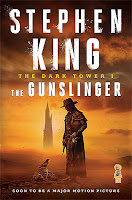Ages ago, I read
The Long Walk, my first Stephen King novel. This was so long after the outing of Richard Bachman that my copy didn't even bother to advertise it that way except in the fine print underneath King's name. I remember thinking that maybe I was more drawn toward the gritty Bachman style than King's more typical supernatural horror system. Now having read the other three books in the opening Bachman quartet, I think it is safe to say that probably isn't the case. Unfortunately, as was the case with
Roadwork and
Rage,
The Running Man just isn't that good a book.
The Running Man is Bachman's return to the vague dystopia with an appetite for extreme entertainment last seen in
The Long Walk. This time around, things are much less subtle. Things are totally dysfunctional and the air is literally not safe to breathe. Whereas the other novel hinted and nudged at what was wrong with the world, this one liked to shove hard. Things are pretty crappy in 2025 and it is thrown in readers' faces at every turn. The TV (er..."free-vee") tells us what do say, do, and believe. Well, actually I guess that isn't too far removed from today. That and the continued popularity of "reality" shows, though even the most gratuitous in our timeline don't touch the visceral entertainment of
The Running Man.
I like to joke that every contestant on "American Ninja Warrior" is fighting against unimaginable odds in life, and that just their mere appearance on the show neutralizes all that pain. Nobody just accidentally ends up on the show, and certainly nobody gets on the show that has benefited from immense privilege or luck. So is the case with Ben Richards, who turns to the games as a way to pay his way out of a terrible situation of a sick child and no way out of the gray slums. Of course they don't just take anybody, so he pushes his way through a boot-camp winnowing process that earns him a spot on the most popular (and deadly) of the shows, "The Running Man". This show doesn't need fancy sets, and almost the entire populace gets to play along. Ben just needs to survive endless pursuit by the Hunters and the general population of informers, who earn rewards for their tips. Ben can't just hole up in a panic room for 30 days to earn his billion dollar grand prize. He needs to record himself and advertise his whereabouts twice a day. Furthermore, the producers of the game like to get the bloodlust flowing by heavily editing his footage to make him come off as a raging maniac. The good news (for Ben) is that there is so much disgust with the way the world works that he finds a few allies along the way, some more willing than others to render assistance. He also manages to uncover a vast conspiracy about air pollution that he does his damnedest to advertise through the show. Eventually he goes head to head with the Hunter-in-Chief himself, Evan McCone, culminating in a spectacular plane crash right into the heart of the Network's game headquarters, killing everyone (I warned you there all spoilers here, so sorry/not sorry).
In the right hands, there might have been some compelling story here, but the tone of the novel rings crass for the most part. First and most glaring is the technology. A lot of pre-1990's science fiction suffers from this and the stuff between (let's just say) 1960 and 1990 haven't aged enough to become cutely anachronistic. Therefore it is pretty laughable that Ben needs to wear a bulky body-cam with physical tapes that must to transmitted through the postal service. Now, it may sound like I'm making fun of Bachman/King for not anticipating the Internet, but I think it suffers more from being a rather contrived way of forcing Ben to not just play an advanced game of hide-and-seek with the Hunters. On the other hand, I can't really say what I would do, so I'll try to be generous. Second liability of the book is the characters. Bachman characters are not renowned for being King's most fleshed-out characters, but the cast here was pretty cardboard, especially the women and minorities. It is most ridiculous when we get to the climax and the supposed Uber-Hunter McCone turns out to be the world's stupidest negotiator, who refuses to call Ben's bluff but then claims he knew all along it was a bluff. Finally, the overall tone of the book is pretty choppy. Ben kind of comes off as a jerk, blowing up a building in a total-overkill moment, then pretty much ruining everyone he came into contact with. By the end, Ben doesn't even have anything to live for, learning that his wife and daughter, the very reason he was putting up with all this crap, were dead. I will tip my hat to Bachman though, that Amelia getting sucked out of the plane, though also very crass, was the most I think I've laughed at anything written by King.
As we will see in the next post, this was the only Bachman book to date that earned the movie treatment. The basic premise of the novel, merging dystopia, game shows, and the future was probably utterly irresistible. The novel in itself is a little thin on glitz, however, to make an exciting movie, plus the heavy amount of interaction between the game and the everyday world probably would send the wrong message, so the movie version is very different. Not
Lawnmower Man different, but, as we shall see, different. Paging Arnold Schwarzenegger....









